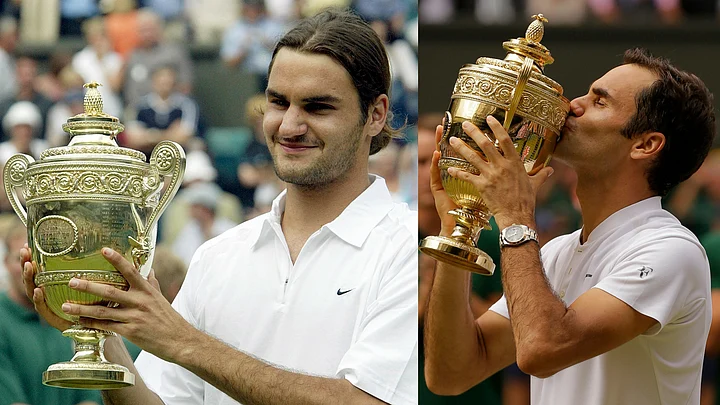Go back 15 years, to the start of Wimbledon in June 2003, and take a glimpse at where things stood for Roger Federer.
He was 21. He had yet to reach No 1 in the ATP rankings. Not only had the guy never won a Grand Slam tournament, he'd never even been past the quarter-finals at one. He was coming off a first-round loss at the French Open a month earlier, and another at the All England Club a year earlier.
When all was said and done two weeks later, Federer was crying, cradling the champion's gold trophy.
And now? When play begins at Wimbledon on 2 July, with Federer closing in on his 37th birthday, he will have the honor of playing the first match at Centre Court as the defending champion.
He earned his record eighth title at the grass-court major a year ago, and he ran his total Grand Slam haul to a record 20 men's singles trophies by winning the Australian Open in January.
I don’t know how much longer it’s going to last. I have no idea.Roger Federer
He was speaking about his own success. But he might as well have been talking about the two-man supremacy exhibited by himself and his greatest rival, Rafael Nadal.
Nadal, 32, hadn't even entered a major tournament in 2003. These days, he trails only Federer in the all-time men's Grand Slam standings, with 17 of his own, including No 11 at the French Open just this month.
Remarkably, especially given all of the talk in recent years about their supposed declines, Federer and Nadal have divvied up all of the past six major titles, claiming a trio apiece.
It's their longest such stretch since grabbing six consecutive majors in 2008-09, which included Nadal's 9-7 fifth-set victory over Federer in the 2008 Wimbledon final, considered by many to be the greatest tennis match ever. The duo's best run was 11 Slams in a row from 2005-07, when Federer won eight and Nadal the other three.
"This is perfection. They are the best players in the world and are proving that even when your body is not as young as it was, when one still has the drive and is well prepared, nothing replaces talent and strong will," said French Open tournament director Guy Forget, a former top-five player and captain of France's Davis Cup and Fed Cup teams. "The young players are still lagging behind."
Yes, all these years later, Roger and Rafa are still leading the way.
One other indication: They have swapped the No 1 ranking a half-dozen times in 2018, the most it’s switched hands in a single season since 1999.
As of now, Nadal is No 1, and Federer No 2 — but just barely, with a 50-point gap between them. Because Wimbledon's seeding system takes into account the men's success on grass, Federer is No 1, and Nadal No 2, in the draw.
This is the fifth time that they are seeded 1-2, and first since 2010. Each of the other four times, one or the other collected the title: Nadal in 2008 and 2010, Federer in 2006 and 2007.
"They won everything — both of them won everything, and not only once, but so many times," said Robin Soderling, who lost to Federer in the 2009 French Open final (after upsetting Nadal along the way) and Nadal in the 2010 French Open final (after upsetting Federer along the way). "But they are still hungry."
They manage their schedules more carefully in their 30s: Federer skipped the clay-court circuit, while Nadal opted not to play any grass-court tuneups before arriving at the All England club.
He's a two-time champion and three-time runner-up at Wimbledon, but Nadal had some trouble at the place lately, failing to get past the fourth round in any of his past five appearances, with a quartet of losses to players ranked 100th or worse.
"Wimbledon has always been difficult for us," said Nadal's uncle and former coach, Toni, "but I believe that he will have his chance if he is physically fit."
It's good health that has stood in the way of Novak Djokovic (elbow), Andy Murray (hip) and Stan Wawrinka (knee), who all are in various stages of returning from operations.
But here are Federer and Nadal, as good as ever.
Maybe even better than ever?
"I don't know. It's hard to tell. It doesn't really matter to me," Federer said.
I would hope that I’m a better player today, just because of the virtue of time that’s gone by and I’ve had time to practice and train and all that stuff.Roger Federer
"But it's different times today than it was 10, 15 years ago."
